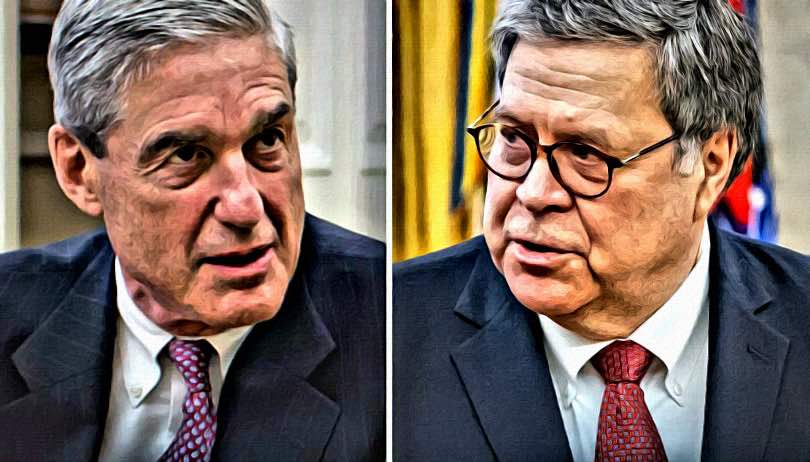When William Barr accepted the nomination to replace Jeff Sessions as attorney general, it was neither to be Donald Trump’s personal lawyer nor to undermine the US Constitution. Rather, Mr. Barr accepted a mission to restore the rule of law and principles of limited government to the executive branch – just as Madison prescribed in Federalist Paper 51:
In framing a government which is to be administered by men over men, the great difficulty lies in this: you must first enable the government to control the governed; and in the next place oblige it to control itself.
To this end, General Barr had to inject principles of justice into the runaway Mueller probe and open investigations into Obama-era leaks, spying and obstruction. Barr explained this to CBS News last week: “From my perspective, the idea of resisting a democratically elected president, that is where the shredding of our norms and institutions is occurring.”
Harvard Law’s Alan Dershowitz observed that Bob Mueller’s Wednesday press conference “went beyond the conclusion of his report, by implying that President Trump might have committed obstruction of justice.” Mueller ignored DOJ guidelines and the presumption of innocence that is the right of every American – even President Trump.
The job of a prosecutor is to charge or not to charge – not prove the innocence of the target of an investigation. Mueller’s farewell should have focused on these lines: “I am speaking out today because our investigation is complete [and] I do not believe it is appropriate to comment further about the investigation.” That would have represented a proper declination to indict – – followed by silence.
But no – Mueller threw cold water on the president’s “exoneration” talk by adding this nugget: If we had had confidence that the president clearly did not commit a crime, we would have said so. Absent an indictment, Mueller’s views on the Comey firing and Trump’s critical tweets have no more legal standing than Hillary Clinton’s opinions. Thus, his was a partisan cheap shot.
Mueller’s pro-Hillary lawyers threw a bone to House Democrats with this nugget: The Constitution requires a process other than the criminal justice system to formally accuse a sitting president of a wrongdoing. Ahem. Mueller was supposed to deliver the confidential report to the attorney general – not gather and deliver “impeachment” evidence to Nancy Pelosi. In a single sentence, Mueller proved to Republicans his was a partisan investigation.
Perhaps Mueller wanted to help Nancy Pelosi, whose “cover up” comments triggered Trump’s declassification order (source: New York Post). Mueller never looked into Obama-era spying, but he surely knows declassification will spill CIA-DOJ-FBI-NSI secrets into daylight. Pelosi, who is quietly organizing her party’s impeachment posse, knows the Obama-era stench could be vast – and influence the 2020 elections.
On January 3, 2017, before Trump’s inauguration, Chuck Schumer (D-NY) told an MSNBC audience, “Let me tell you: you take on the intelligence community – they have six ways from Sunday at getting back at you.” It is no stretch to assume the New York senator knew something. These declassifications are a big deal, and Trey Gowdy (R-SC) has seen enough classified documents to predict the worst.
Gowdy believes partisan cops and spooks tried to undermine Trump’s upstart campaign and young presidency. General Barr told CBS News as much: “The use of foreign-intelligence [and] counterintelligence capabilities against an American political campaign to me is unprecedented, and it’s a serious red line that has been crossed.”
It is clear Barr suspects Obama apparatchiks of illegal spying, unmasking and leaking. He probably believes Bob Mueller’s farewell was politically motivated. These are the actions of a partisan deep state that libertarians have long protested. General Barr expects the deep state to watch the Taliban, but draws a “red line” to prevent the partisan use of the deep state. And there you have it: William Barr is on a mission to purge partisan actors from intelligence and law enforcement.
House Democrats would do well to remember Ken Starr’s investigation into a possible Clinton-Whitewater crime that detoured into sexual impropriety (and a perjury trap). They should see the similarities: the Mueller team was supposed to investigate Trump-Russia collusion, but detoured into obstruction (and hints of impeachable offenses). Were either of these special investigations just – or just partisan sedition?
Imagine if Republicans had forced a “special investigation” into John Kennedy’s handling of the covert Bay of Pigs invasion of Cuba. Of course, his attorney general, brother Robert Kennedy, would have been recused – leaving a special counsel to un-cover JFK’s frequent amphetamine shots and mob-associated mistress. These “incidental” discoveries would have re-directed Americans from a botched military operation to the moral fitness of an otherwise fine president.
It seems obvious William Barr believes we the people grant power in free elections for the benefit of the people – not to see it abused time and again. Democrat votes did not grant Congress the power to impeach Bill Clinton, and Republican votes did not grant Obama the power to spy on the Trump campaign. The constitution protects every American from a too-powerful government, including presidents and presidential candidates.
